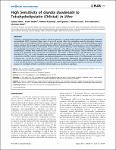High Sensitivity of Giardia duodenalis to Tetrahydrolipstatin (Orlistat) In Vitro
Hahn, Juliane
Seeber, Frank
Kolodziej, Herbert
Ignatius, Ralf
Laue, Michael
Aebischer, Toni
Klotz, Christian
Giardiasis, a gastrointestinal disease caused by Giardia duodenalis, is currently treated mainly with nitroimidazoles, primarily metronidazole (MTZ). Treatment failure rates of up to 20 percent reflect the compelling need for alternative treatment options. Here, we investigated whether orlistat, a drug approved to treat obesity, represents a potential therapeutic agent against giardiasis. We compared the growth inhibitory effects of orlistat and MTZ on a long-term in vitro culture adapted G. duodenalis strain, WB-C6, and on a new isolate, 14-03/F7, from a patient refractory to MTZ treatment using a resazurin assay. The giardiacidal concentration of the drugs and their combined in vitro efficacy was determined by median-effect analysis. Morphological changes after treatment were analysed by light and electron microscopy. Orlistat inhibited the in vitro growth of G. duodenalis at low micromolar concentrations, with isolate 14-03/F7 (IC5024h = 2.8 µM) being more sensitive than WB-C6 (IC5024h = 6.2 µM). The effect was significantly more potent compared to MTZ (IC5024h = 4.3 µM and 11.0 µM, respectively) and led to specific undulated morphological alterations on the parasite surface. The giardiacidal concentration of orlistat was >14 µM for 14-03/F7 and >43 µM for WB-C6, respectively. Importantly, the combination of both drugs revealed no interaction on their inhibitory effects. We demonstrate that orlistat is a potent inhibitor of G. duodenalis growth in vitro and kills parasites at concentrations achievable in the gut by approved treatment regimens for obesity. We therefore propose to investigate orlistat in controlled clinical studies as a new drug in giardiasis.
No license information

